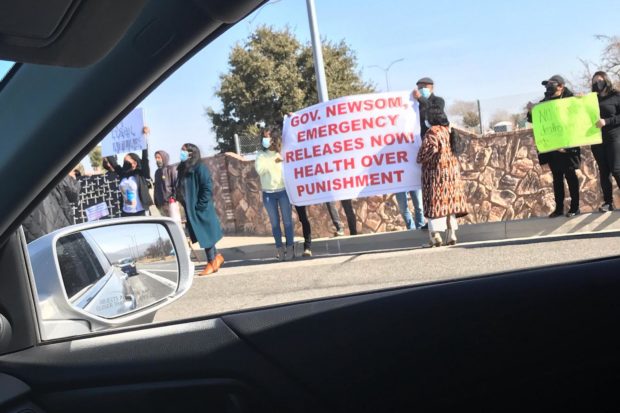
By Eduardo Stanley
Covid-19 is spreading fast among inmates in jails and prisons everywhere as some people had warned from the beginning of the pandemic—from health officials to journalists. Prisoners were considered easy “targets” of the virus, as well as farmworkers and those working at meatpacking houses and warehouses. While the state of California made efforts to inform workers, even producing PSAs in different languages, the prison system did little—if anything—to prevent or to control the spread.
Prison agglomeration is in part responsible for the high number of cases, but what really surprises analysts is the lack of implementation of drastic measures to control the situation.
Due to this paralysis, relatives and supporters of inmates have voiced their concerns and demands to authorities (see Serving Dead Time Without Answers).
“Because of Covid-19, relatives of inmates around California started to get organized,” says Eugene Hernandez of Lancaster. “Basically, this problem started because guards brought in the virus.”
Hernandez, whose granddaughter is at the Central California Women’s Facility in Chowchilla, explains that prison authorities denied at the beginning the severity of the pandemic, but as the cases of contamination, sickness and even the death of inmates escalated, they showed concern. Nevertheless, the infection in the facilities seems to be unstoppable.
“They are incompetent; not all guards use masks, and they don’t isolate those inmates who carry the virus,” says Hernandez. “They punish prisoners who talk to the media or who give information to their relatives.”
Hernandez describes the situation as “horrific” within the facilities, with inmates sleeping on the floor or in corridors and not being able to attend court for their cases. Worse, many prisoners refuse to go to the cafeteria to get their food so they purchase ramen—sometimes as their only meal of the day.
Desperate to make their voices be heard, a motorcade of 200 cars went to Lancaster prison to protest these conditions on Jan. 9.
“Inadequate medical care, incompetent administration and brutal uncaring conditions have aggregated current conditions,” explains Hernandez.
“In Chowchilla women’s prison, more than 400 women have gotten the virus. Guards have put infected prisoners with noninfected ones. No medication, blankets or food is given to women who line the cold hallways.”
Relatives and supporters of prisoners are reaching out to Governor Gavin Newson and U.S. Senator Alex Padilla, asking for the release of those prisoners who are old, sick and short timers.
“Some folks shouldn’t be there to begin with,” said Hernandez. “We are demanding that this third world treatment be stopped and that prisoners be treated like human beings.”
*****
Eduardo Stanley is the Community Alliance newspaper editor. Contact him at editor@fresnoalliance.com.
